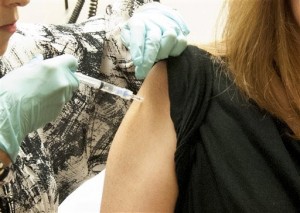
The National Institute of Health began testing an experimental Ebola vaccine on human subjects this week after heavy pressure to expedite the development process.
The move came in response to international concern as the World Health Organization reported more than 1,800 deaths as of Aug. 31. Ebola, which WHO claims can have up to a 90 percent fatality rate, has rapidly spread from its origin in Guinea to surrounding countries in West Africa.
“The main concern is the spread of the disease,” said Gene Cole, a BYU professor specializing in infectious disease prevention and control. Cole explained that there have been cases where people get on a plane feeling fine but exhibit Ebola symptoms by the time they arrive at their destination. Customs departments are not trained to stop people just for looking sick, so people who are incubating can slip through.
The human trials began a week after CBS News revealed that the experimental drug, named ZMapp, was given to U.S. medical missionaries but withheld from stricken African countries, drawing criticism from many health organizations. The National Institute of Health reported that the drug is being tested on healthy Americans, ages 18–50, who volunteered for the trial. Each volunteer will receive approximately $1,700 for their participation.
Unfortunately many experts believe that ZMapp will not be ready in time to benefit those affected by this particular outbreak.
“Vaccine development takes years and years,” Cole said. “The best thing right now is education in prevention and control.”
According to Cole the biggest problem contributing to the spread of Ebola is a lack of effective control processes in health care facilities.
“You have rural hospitals that are reusing needles and syringes and other medical materials,” Cole said.
He also explained that culture is a big factor in the spread of the virus. For example, it is customary that family members help prepare the body for burial, bringing them in contact with the body fluids of the deceased. This is a major problem for a virus that is transmitted through bodily fluid.
Other firsthand accounts describe the lack of information as problematic also.
“News doesn’t spread fast there. I don’t think a lot of them even know that there is a problem,” said Hannah Cosper, a UVU student majoring in American Sign Language.
Cosper, a Utah native from Alpine, recently returned from Ghana, where she worked with Signs of Hope International. She left just days before the Peace Corps began evacuating volunteers from the affected nations. “A lady in our group was trying to get back to Ghana, and they didn’t let her back in,” she said.
According to Cole, BYU students need not be overly concerned about the virus sweeping through Provo because the U.S. health care system is more prepared to deal with the virus.
Timothy Elliott, director of international study programs at BYU, agreed with Cole. “We don’t have any students in the countries that were initially affected by Ebola,” he said. “The students we had in Ghana are all back. As far as we can tell BYU hasn’t had any exposure.”
The International Study Program doesn’t have another group schedule to go to Ghana until spring, according to Elliott. He said it’s still too early to decide if they will be able to continue the program, but they are watching West Africa very closely.




